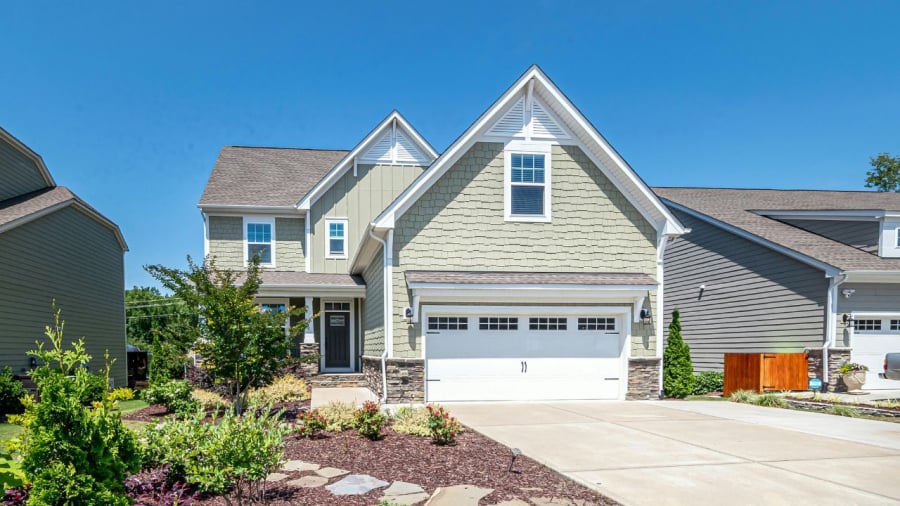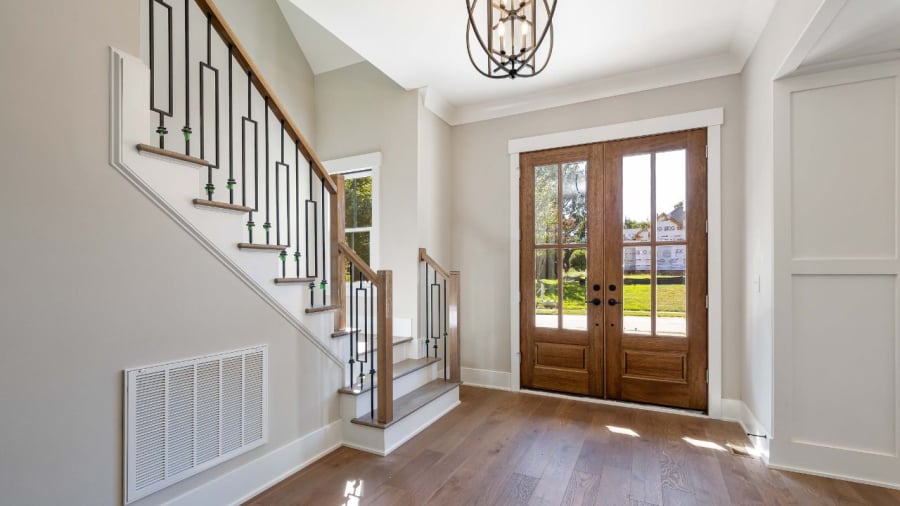In Asian culture, building a house is considered one of the most significant endeavors in life, as it is a valuable asset and a sanctuary for its inhabitants. A house is believed to harbor the family’s energy and nurture their happiness.
Determining the orientation and entrance of a house is of utmost importance. A traditional saying warns, “A house with two doors brings turmoil to its people and their wealth.” But is there any truth to this?
What is a house with two doors?
The term “house with two doors” typically refers to a residence with two entryways of similar proportions and functionality, making it challenging to distinguish which is primary and which is secondary. Alternatively, it may refer to a house with two doors directly facing each other. In feng shui, this arrangement is considered unfavorable as it leads to a depletion of positive energy and fortune.

How does a two-door house impact feng shui?
Since ancient times, our ancestors have emphasized the importance of a single door, stating, “One door invites prosperity; two doors herald decline.” A house with two equally sized main doors, especially if they are directly aligned, is considered unfortunate for the following reasons:
- Inability to retain positive energy: In feng shui, the flow of energy entering the house should be harnessed and transformed into beneficial energy. When two doors directly face each other, the energy quickly escapes without being properly dispersed or absorbed, leading to financial losses.
- Difficulty in retaining wealth: The two-door structure makes it challenging for financial prosperity to accumulate, akin to “money flowing in through one door and rushing out through the other.” Consequently, families may find themselves in a constant state of financial strain, unable to build substantial savings over time.
- Sense of instability: A house with multiple entry points can make its inhabitants feel insecure and uneasy, lacking a sense of peace and focus in their daily lives.

How does a two-door house affect family life in reality?
Beyond feng shui considerations, social and psychological perspectives also deem a house with two main doors less desirable. Researchers have identified the following implications:
- Family disharmony: Multiple entry points can reduce interactions among family members, leading to misunderstandings and conflicts due to a lack of connection and an increased sense of distance.
- Security concerns: More doors, especially back doors, provide opportunists with easier access and escape routes. In the event of a burglary, controlling the points of entry becomes more challenging.
- Lack of distinction: Having two equally sized doors inadvertently diminishes the sense of formality in guest reception. Traditionally, the main door is reserved for welcoming respected elders, guests, and important visitors, while a smaller side door is used for servants or daily routines. Equalizing the two doors can lead to confusion and a lack of order in family life.
Considerations when building doors:
To ensure both feng shui compliance and convenience in daily life, homeowners should consider the following when constructing their homes:
Designate one primary door that is sizable, prominent, and positioned at the center or where the energy flow is most favorable.
If additional doors are necessary, they should be:
- Offset from the main door to avoid direct alignment.
- Smaller in size compared to the main door.
- Limited in number to prevent energy dispersion and security concerns.
Remedies for a two-door house:
If you already have a two-door house or have purchased one, you can remedy the situation by sealing one door or adjusting their sizes to establish a clear distinction between the main and secondary doors. If the doors directly face each other, consider using a screen or locking one door to create a barrier.
What if a large house has multiple doors?
In larger structures such as mansions or spacious villas, it is understandable to have additional doors at the back or sides. However, according to traditional principles, even in expansive homes, the main door should still be the largest and most ornate, with secondary doors being smaller and positioned off-center.
In modern families, it is common to maintain the tradition of having a single main door, while secondary doors are primarily used for internal access. This practice not only aligns with feng shui principles but also enhances security and fosters a sense of unity within the family.
In conclusion, constructing a house with two equally sized main doors or having them directly face each other not only contravenes feng shui principles but also introduces psychological, security, and familial harmony challenges. Therefore, when designing a home, it is advisable to consult both feng shui and architectural experts to ensure that the house is aesthetically pleasing and conducive to positive energy flow.
Disclaimer: This article is for reference only and does not replace professional advice.






























